Abstract
Digital games are employed with excellent results in teaching because they use to create strong connections between the student and the subject to be learned. On the side of the learner they benefit from interactivity, challenge, immersion and fair assessment of the results, while on the studied subject side they offer repeatability of the notions, fast adaptation to the domain changing, compliance with the student profile and risk free simulations for notions that require experimentation. The paper shows the importance of serious games in education with accent on the business area. It is presented a case study regarding the use in the academic curricula of the IBM INNOV8 serious games, developed by IBM as part of their Academic Initiative program. The study reports the results of master students playing the game and their opinion about its usefulness as training for business activities. There is investigated the perceived connection of the simulations to business process management aspects like process discovery and process modelling, problem recognition, problem solving, iterative process improvement, analytic and strategic thinking, decision making, real-time business management, proactive thinking, defining goals, team work and time management. The paper investigates the possible ties between the business process management encountered in games, the academic background of the students, as well as the profession and position in the company for the employed ones.
Keywords: Computer gamesserious gamesbusiness managementbusiness simulation games
Introduction
1.1.Computer Games Nowadays
While games represent activities providing entertainment since the start of the mankind history,
computer games are fostered for just half of century. Their success is so dramatic that they are now part
of the popular culture. The persons who are playing more video games are doing it not just in the
detriment of watching TV or going to movies (Entertainment Software Association, 2015) but also of
reading. The use of computers for leisure is generalized nowadays – US individuals ages 15 to 19 spend
for playing at a computer an amount of time 6 times higher than for reading and for individuals ages 20 to
24 this ratio is 3.5 (Bureau of Labor Statistics, 2015).
1.2.Experiencing Games in Education
In education, computer games shouldn’t be perceived just like hazards that steal the time of the
learner and endanger his concentration. Serious games, applications that target not just the entertainment,
are successfully used in all levels of education (Vasilateanu, Wyrazic, & Pavaloiu, 2016), (Nichifor,
Dascalu, & Neagu, 2016) mainly because they strengthen the connections between the student and the
subject to be learned.
The Faculty of Engineering in Foreign Languages (FEFL) from the University POLITEHNICA of
Bucharest (UPB) organizes tuition in one of the major languages - English, French or German. One of the
successful Master programs from FEFL is the Business Administration and Engineering (MBAE) one,
organized for 20 years and having several hundreds of graduates. The program is attended by students
with different cultural and educational backgrounds (Pavaloiu, Neagu, Roşu & Dragoi, 2016a), pursuing
management positions in the companies they are working for wanting to improve their digital skills.
Gaming and simulation are good tools to overcome the difficulties raised by taking decisions in real life,
allowing the students to exercise running a business without the fear of making real mistakes and can
experience the outcomes of their actions, so this approach is intensely experienced in our group (Pavaloiu
& all, 2015) (Vasilateanu & all, 2015).
Business Simulation Games (BSG) are excellent training tools, which allow the player to get
experience in the management of economic processes before facing real situations. A business process is
a set of activities designed to achieve a specific organizational goal, the ensemble of business processes
acting like an inner engine for the organization (Trifan & Mustata 2015), (Mustaţă, Trifan & Hănţulie
2016). For a business, to manage processes means to determine how to create products and services and
how you interact with the customers. Business Process Management (BPM) is dealing to the
improvement of a company performance by optimizing its business processes. Simulations are used to
help predict potential impacts of changes to current operational processes and compare business scenarios
prior to implementation, providing a quantitative basis for decision making (Vuksic, Bach & Hernaus,
2014).
Games for Business Management Training
2.1.IBM INNOV8 Games
One of the important BSG examples is provided by IBM’s INNOV8 (Morariu & de Coutere,
2010), (Bulander, 2010). We will present in this paper a case study regarding the use of the IBM
INNOV8 games in the academic curricula as part of Business Management training. The group of
students participating at the experiment come from the MBAE program developed at the FEFL. They
form a heterogeneous group because of their academic and cultural backgrounds, demanding special
attention for academic training. The instruction using simulation-based serious games mends the process
of development for the management aptitudes and provides details and insights into the business that is
under scrutiny, being an adequate groundwork for business management training.
The INNOV8 is a serious game which was developed by IBM as part of their Academic Initiative
programme. They rely on IBM’s Smarter Planet real-world examples: Smarter Traffic (where one has to
synchronize the circulation in a city), Smarter Supply Chain (where on has to maximize the efficiency
and the effectiveness of a supply chain using and environment friendly approach) and Smarter Customer
Service (where one has to maximize the client satisfaction and income). The online version of the game is
available at http://www-01.ibm.com/software/solutions/soa/innov8/innov8game.jsp (Fig. 1).

2.2.Case Study
Pavaloiu, Neagu, Roşu & Dragoi (2016b) presented some of the results of the INNOV8 game
played by the MBAE students from FILS in the last five years. In the period December 2015-January
2016, 41 students filled in a questionnaire about the INNOV8 games. We present here the results
regarding the supposed connections between the games and their influence to BPM aspects like process
discovery and process modelling, problem recognition, problem solving, iterative process improvement,
analytic and strategic thinking, decision making, real-time business management, proactive thinking,
defining goals, team work and time management. The students grade the influence of the INNOV8 games
to these aspects with grades from 0 to 10. Grades from 7 to 10 are considered good and show a large
influence, grades from 0 to 3 are considered low and grades from 4 to 6 show an average influence. One
set of answers was eliminated because of biasing and in a few cases, answers are missing for some
questions.
Considering the usefulness of the INOV8 games for opportunity and problem recognition, 75% of
the students give good grades (Fig. 2). Almost all the students are aware of the importance of these games
in problem recognition because of the help and explanations received during the play.
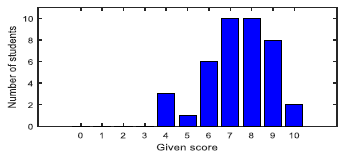
Taking into account the usefulness of the INOV8 games for problem solving, 80% of the students
give good grades (Fig. 3). The games are pretty difficult and some students which considered them as
helpful for problem recognition are not considering them supportive enough for problem solving.
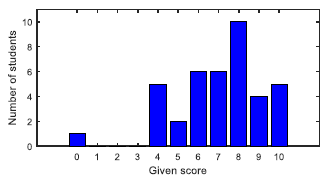
Bearing in mind the usefulness of the INOV8 games for iterative process improvement, 73% of
the students give good grades (Fig. 4). The games can be played many times and the students were
encouraged to obtain good results, without a precise definition of it. At the end of each game the
player obtains a score and many of them tried to improve it. The grades of 8 to 10 are highly
correlated with many repetitions of the game, while there are three students with poor scores
that didn’t answer to this question.
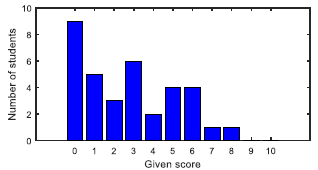
Taking into consideration the usefulness of the INOV8 games for process discovery, just 58% of
the students appreciates them highly (Fig. 5). The large number of students that accorded 5 points does
not belong to the ones with computer science background and are probably not aware of the process
discovery concept. In is extremely probable that they put an average grade to avoid a large mistake in the answer.
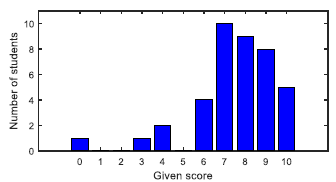
Considering the usefulness of the INOV8 games for analytic and strategic thinking, It can be seen
that 85% of the students give good grades (Fig. 6). This aspect gained the higher scores from the ones
being evaluated, showing excellent appreciation by the students which are employed.
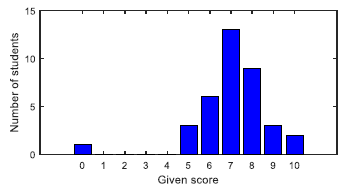
In view of the usefulness of the INOV8 games for decision making, 83% of the students give good
grades (Fig. 7). The results show a great concentration around grade 8, indicating that the students
understood the concept and are coherent in appreciating it and 100% of the students that are employed
gave good grades for this topic.
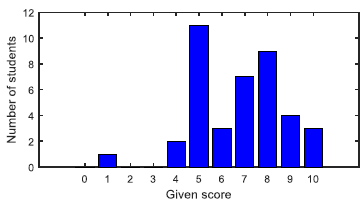
Taking into account the usefulness of the INOV8 games for real-time business management, 68%
of the students give good grades (Fig. 8). There is a rather large number of students that are not confident
with the utility of the games in this aspect and some stated later that they entered the game and played at
their own pace – if there is no timer, they do not consider a game to deal with real-time situations. Some
of the students shown interest in the discussions after the questionnaire to have a real-time part of the
game, where decisions should be made on spot.
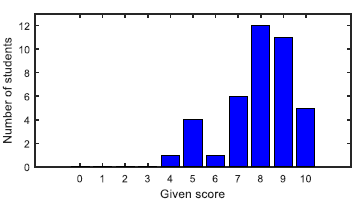
In view of the usefulness of the INOV8 games for proactive thinking, 80% of the students give
good grades (Fig. 9). The distribution of the results is not a gaussian one, showing that probably some of
the students have not understand the concept meaning.
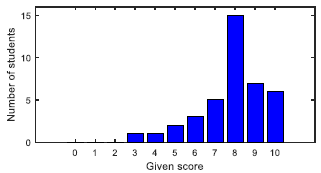
Considering the usefulness of the INOV8 games for defining goals, 69% of the students give good
grades (Fig. 10). Some of the students with very good academic results have given small scores at this
topic, complaining that the scenarios have imposed some trajectories and they have not the freedom to
chooses and follow their own goals. Another complain come for the fact that the games targets have given
loads and the weights are questionable because the goals asserted by the game designers may not be the
desired ones – a student asked “why not to care more for the environment?”.
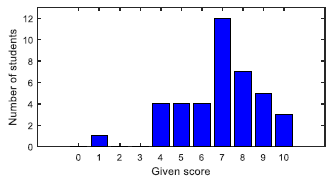
Taking into consideration the usefulness of the INOV8 games for time management, 64% of the
students give good grades (Fig. 11). The students appreciate this topic, but there is no emphasis on the
influence of the INNOV8 games on tine management, the results being sparsely distributed on the good
and average zones of influence.
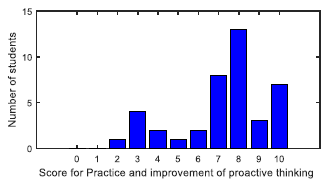
A validation question for the test asked about the usefulness of the INOV8 games for team work. Since
the games are played individually, one should small scores to this request. The students performed well,
with just 6% of the students giving good grades (Fig. 12). As for the good answers, 23% of the students
have given grade 0 and 13% decided not answered to the question.
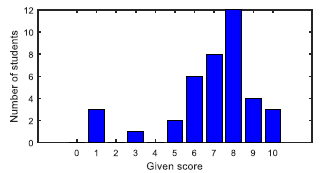
Conclusions
The students recognize the value of IBM INNOV8 games and understand the connection between
the simulations from the games and the business process management aspects. The games are considered
an easier and pleasant learning method by the students and they are appreciated by the professors because
they are effective in training students with different cultural and educational backgrounds. We were
inspired by the INNOV8 games results to participate in the Academic Initiative from IBM (2016) and we
intent to enlarge the exploitation of serious games in the learning process.
References
- Bulander, R. (2010). A Conceptual framework of serious games for higher education - conceptual
- framework of the game INNOV8 to train students in business process Modelling. IEEE
- Proceedings of the 2010 International Conference on e-Business (ICE-B)
- Bureau of Labor Statistics. (2015). American time use survey — 2015 Results, U.S. Department of Labor.
- Retrieved from http://www.bls.gov/news.release/pdf/atus.pdf
- Entertainment Software Association. (2015). Essential facts about the computer and video game industry.
- Retrieved from http://www.theesa.com/wp-content/uploads/2015/04/ESA-Essential-Facts-2015.pdf
- IBM. (2016). Academic Initiative. Retrieved from https://developer.ibm.com/academic/
- Morariu, J., & de Coutere, B. (2010). IBM’s examples of social learning and immersive learning.
- Conference ICL2010, September 15 -17, 2010 Hasselt, Belgium
- Mustaţă, C., Trifan, E. L., & Hănţulie, C. (2016). Case study: Using the Topsim General Management 2
- Business simulation software to develop the key entrepreneurship competences. Proceedings of
- ELSE 2016 The 12th International Scientific Conference eLearning and Software for Education,
- Bucharest, April 21-22, 2016
- Nichifor, C. C., Dascălu, M. I. & Neagu, A. M. (2016). Cognitive training games to improve learning
- skills. Proceedings of ELSE 2016 The 12th International Scientific Conference eLearning and
- Software for Education, Bucharest, April 21-22, 2016, doi: 10.12753/2066-026X-16-051. 360-366
- Păvăloiu, I. B., Dascălu, M. I., Vasilăţeanu, A., Mitrea, D. A., Căruţaşu, G., & Drăgoi, G. (2015). The
- simulated enterprise as a learning environment for a future career. EDULEARN15, 7th International
- Conference on Education and New Learning Technologies, ISBN: 978-84-606-8243-1, pp. 5427-
- 5434
- Pavaloiu, I. B., Neagu, A.M., Roşu, S. M., & Dragoi, G. (2016a). Technical education in foreign
- languages, demands and opportunities. INTED2016, The 10th annual International Technology,
- Education and Development Conference, doi: 10.21125/inted.2016.0938, 8285-8291
- Pavaloiu, I.B., Neagu A.M., Roşu, S.M. & Dragoi, G. (2016b). IBM INNOV8 business simulation games
- for e-Learning. Proceedings of ELSE 2016 The 10th International Scientific Conference eLearning
- and Software for Education, Bucharest, April 21-22, 2016, doi:
- Trifan, L., & Mustata, C. (2015). Inducing entrepreneurial behaviour by business management simulation
- games. Edulearn15, 7th International Conference on Education and New Learning Technologies,
- 4-8 Iulie 2015, Barcelona, Spania, ISBN 978-84-606-8243-1, pp. 6426-6433
- Vasilăţeanu, A., Dascălu, M. I., Păvăloiu, I. B., Căruţaşu, G. & Drăgoi, G. (2015). Interactive learning
- methods using a simulated enterprise. Proceedings of ELSE 2015 The 11th International Scientific
- Conference eLearning and Software for Education, Bucharest, April 23-24, 2015, doi:
- 10.12753/2066-026X-15-213, Vol. 3. 210-216
- Vasilateanu, A., Wyrazic, S., & Pavaloiu, B. (2016). A science fiction serious game for learning
- programming languages, Proceedings of ELSE 2016 The 12th International Scientific Conference
- eLearning and Software for Education, Bucharest, April 21-22, 2016, doi:
- 16-082. 561-564
- Vuksic,V. B., Bach, M. P., & Hernaus, T. (2014). Educating students in business process management with
- simulation games. International Journal of Social, Behavioral, Educational, Economic, Business
- and Industrial Engineering Vol:8, No:5, 2014. 1236-1241
Copyright information

This work is licensed under a Creative Commons Attribution-NonCommercial-NoDerivatives 4.0 International License.
About this article
Publication Date
25 May 2017
Article Doi
eBook ISBN
978-1-80296-022-8
Publisher
Future Academy
Volume
23
Print ISBN (optional)
-
Edition Number
1st Edition
Pages
1-2032
Subjects
Educational strategies, educational policy, organization of education, management of education, teacher, teacher training
Cite this article as:
Păvăloiu, I. (2017). Games As Student Groundwork For Business Management Training. In E. Soare, & C. Langa (Eds.), Education Facing Contemporary World Issues, vol 23. European Proceedings of Social and Behavioural Sciences (pp. 1016-1024). Future Academy. https://doi.org/10.15405/epsbs.2017.05.02.125

